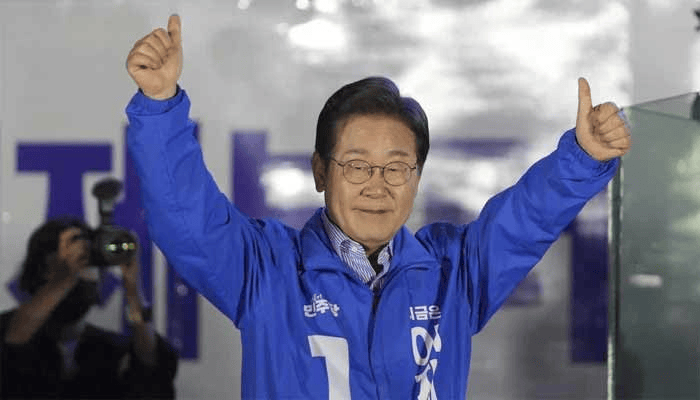South Korea Presidential Election
 South Korea Presidential Election
South Korea Presidential ElectionIn a remarkable and historic turn of events, opposition Democratic Party candidate Lee Jae-myung has declared triumph in the snap presidential contest today. Based on preliminary exit polls published by local media, Lee has moved ahead of his challenger, Kim Moon-soo of the ruling People Power Party, behind with 39.3 percent of the vote. South Korea Presidential Election Following months of political upheaval and uncertainty, this result signifies a significant realignment of power in the nation.
Following a severe and divisive political crisis whereby former President Yoon Suk-yeol was ousted, the snap election was scheduled. After declaring martial law, a decision that set off public indignation, global concern, and finally his impeachment, Yoon was ejected from office. Many saw the declaration as a direct attack on South Korea’s democratic values, therefore sparking major demonstrations and quick legislative reaction. One of the stormiest moments in South Korea’s post-war political history, the fall of Yoon’s government marks a turning point in the country’s search for stability and democratic rejuvenation today.
In South Korean politics, seasoned politician and former Gyeonggi Province governor Lee Jae-myung has been rather active. Renowned for his progressive ideas, populist speech, and strong criticism of conservative elites, Lee had stood for president in 2022 but very barely lost to Yoon. Driven by public dissatisfaction with the last government and a fresh need for reform, Lee launched a strong campaign this time emphasizing the restoration of democratic standards, fight of corruption, and economic recovery.
Lee underlined throughout the campaign the importance of institutional change and national healing. “We must rebuild what has been damaged, both in our governance and in the public’s trust,” Lee stated at his last rally. In relation to North Korea and the United States, his campaign promises included a fresh emphasis on income equality, enlarged social services, and a recalibration of South Korea’s approach to both internal and foreign concerns.
Former National Assembly member and labour activist turned conservative leader Kim Moon-soo, his main rival, battled to separate himself from the tain of Yoon Suk-yeol’s administration. Kim stressed continuity, stability, and conservative ideals, but his campaign did not inspire fervour among a tired voters disappointed by the policies of the past government. Many voters see Kim as a continuation of the current quo, hence his affiliation with the People Power Party probably hampered his capacity to win more support.
Reflecting the demand of the voters for alternatives, this election also included several candidates from minor parties and independent backgrounds. Although these contenders received a small portion of the vote overall, their presence highlighted the complexity of popular opinion and the need of a more varied political scene.
The great public interest and great stakes surrounding the election are shown by the great turnout recorded in today’s voting. Early projections indicate voter turnout might have topped 70 percent, a notable rise over past elections. The dramatic events surrounding the election call as well as the contentious character of the candidates engaged help to explain this increased participation.
Given South Korea’s strategic relevance in the Asia-Pacific area, international observers kept careful eye on the election. Shortly after exit polls indicated Lee Jae-myung’s success, the U.S., Japan, and European Union nations sent congrats and showed support for the democratic process. With regard notably to China and North Korea, analysts hope Lee’s administration will bring modest but significant changes in South Korea’s foreign policy, probably favouring a more balanced approach between old friends and regional diplomacy.
Economically, Lee’s victory could point to a leftward turn with possible labour law amendments, more public expenditure, and progressive tax laws. Drawing on South Korea’s status as a world leader in digital infrastructure and green energy projects, his government is also likely to stress environmental sustainability and technical innovation.
Domestically, though, Lee has great difficulties. Governance will be challenging in South Korea given the shattered nature of its political institutions, residual mistrust among people, and a very politicized media scene. Although his Democratic Party might have fresh energy right now, it does not ensure seamless legislative collaboration or general political harmony.
Lee adopted a conciliatory tone in his post-election speech, pledging to rule for every South Korean regardless of party inclination. “This triumph marks democracy itself, not only for one party,” he said. “We will pay attention to every voice, including those that feels invisible. Unity, justice, and rehabilitation form the road forward.
Yoon Suk-yeol’s ouster also begs issues regarding institutional protections and responsibility. Thorough investigations into the martial law proclamation and related abuses of power are demanded by several leaders of civil society and watchdog organizations Lee has promised to assist an impartial investigation since he believes that justice must be done to guarantee that such a crisis never recurs.
Looking ahead, the South Korean people are starting a period of change. The next several months will be crucial for the incoming government as it develops a first 100-day policy program, names important cabinet members, and helps to calm the political environment. Though hopeful, many South Koreans approach the future warily.
Lee’s election is symbolic of a larger desire among South Koreans to reinforce democratic values and reject authoritarian impulses, not only a political triumph. It shows the strength of democratic institutions and the ability of citizen participation to make leaders answerable.
The eyes of the world stay on South Korea as the last ballots are tallied and the official results are verified in the next days. Today’s election is a gripping story of how a country’s people, driven by crisis, may recover their voice and plot a new course in a period of global instability and democratic slippage in many nations.











